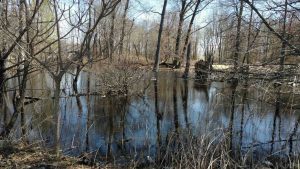
The Richmondtown & Clarke Avenue Civic Association in Staten Island, NY is on a mission to curb irresponsible development and preserve important ecosystems such as wetlands. The group is currently working with the Staten Island Coalition for Wetlands and Forests to protect the Graniteville Wetlands from being destroyed by the construction of a large BJ’s Warehouse store, gas station and parking structure. These wetlands were instrumental in protecting the community against the devastation wrought by Hurricane Sandy. Hundreds of homes and an area of approximately 30 acres, of both freshwater and tidal wetlands, are at stake. Another issue of concern is pollution and waste management, particularly litter and illegal dumping which pollute local waterways and damage ecosystems. Additionally, as Staten Island is home to several landfills, the Association is advocating for responsible waste management practices that minimize the risk of environmental contamination.

This is a photo of where the gas station is proposed to be built [in the Graniteville wetlands area, where a BJ’s and strip mall are also planned. NY DEC has stated that this is area is not a wetland.
Three miles from the now-closed Fresh Kills Landfill – once the largest landfill in the world – the small neighborhood grassroots group keeps a watchful eye on their historic Richmondtown community. Richmondtown faces moderate risk of flooding, severe risk from heat, and worse air quality than 80% of neighborhoods in New York, according to Risk Factor. Leading the Richmondtown & Clarke Avenue Civic Association are Carol Donovan and Susan Conlon, steadfast fixtures at Staten Island commission meetings, advocating for a safe, sustainable home. The area’s Special South Richmond Development District designation mandates new buildings maintain the existing community character, requires tree preservation and planting, controls change in the topography, limits the height of buildings, and restricts construction within 100 acres of vacant land. Despite this, the Richmondtown group remains vigilant, monitors new development, and raises the alarm to anything that endangers the environment.